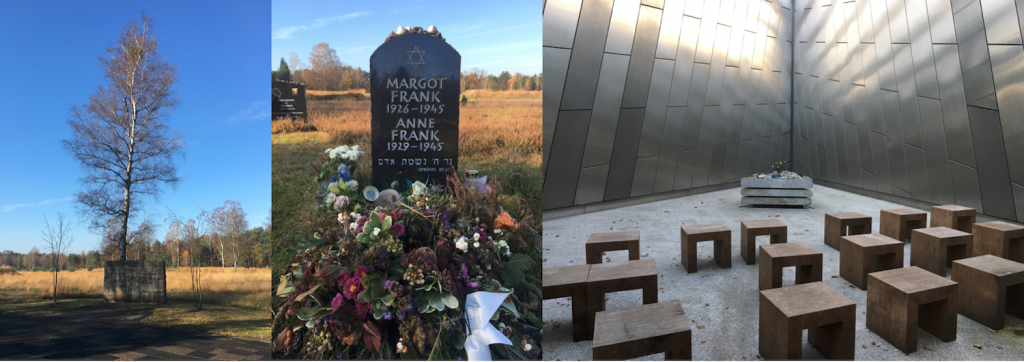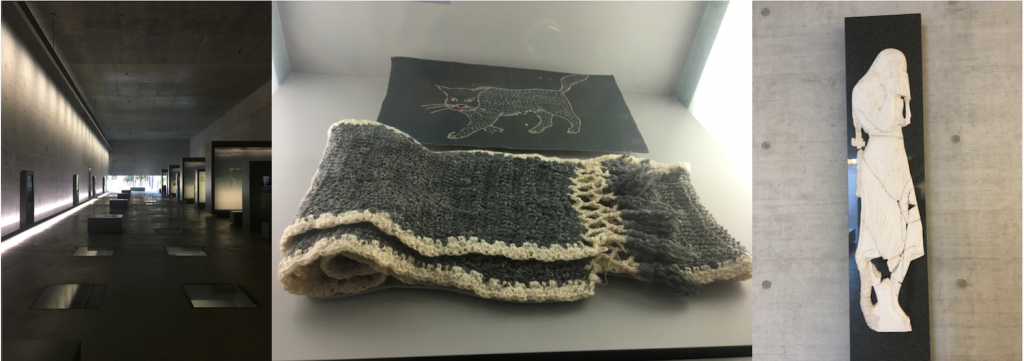
28.10.1944 Anne & Margot Frank sent to Bergen Belsen, where they lost their lives in the early 1945.
-1945 to 1945 : the camp was served as POW (prisoners of war) camp, where a total of 50,000 soldiers lost their lives.
-1943 to 1945 : part of the POW camp was used as the Nazi concentration camp, in which at least 52,000 of the total of around 120,000 prisoners lost their lives.
-1945 to 1950 : on 15.April 1945 the camp was liberated by British army.
Bergen-Belsen was used as the DPs (displaced person’s) camp until the September 1950.
Tuesday Nov.9. I took a train at 6:45am. from the Berlin central station.
The station Celle to the memorial was 1hour by two buss. Trees, fields, cows and horses, I adored the calming autumn nature in the area and arrived to the memorial, Gedenkstätte Bergen-Belsen at 10:30am.
The first two hours I walked around the memorial field and POW cemetery. The post barracks, crematorium and cemetery area, except the silent prayer room there are no buildings, only some grave stones and memorial objects stand on the huge field.
In the end of the video, you could hear the firearm. It was very sunny and empty, I only saw one tourist and two soldiers in the field.
But during ca.1.5 hours in the memorial fields, I was confused by kept hearing enomous firearm shots from afar, and I soon found the military security area notice board. Only ca.2km away from the memorial and the POW cemetery is now British military base.
But during ca.1.5 hours in the memorial fields, I was confused by kept hearing enomous firearm shots from afar, and I soon found the military security area notice board. Only ca.2km away from the memorial and the POW cemetery is now British military base.
The modern documentation center have very detailed history about the POW camp, the concentration camp and DPs camp.
Numerous displays I you can hear the original interviews of the survivors; soldiers and imprisoned civilians, also some interviews of the local children at that time.


ASHES
At the camp Bergen-Belsen, it wasn’t clear what was exactly done with the ashes.
The book “The Memory Monster” by Yishai Sario and my physical visits of KZs have steadily influenced on my perception.
Every memorials I went have the gray, the color of the ashes.
Every memorials I went have the gray, the color of the ashes.
At the camp Auschwitz-Birkenau the ashes had used as fertilizer.
My Polish tour said that cremation wasn’t common way for Jews. And the guide repeatedly said “it was happened on our earth”, as if she mentioned saying “the nature of all those area have absorbed the ashes of the victims.”
My Polish tour said that cremation wasn’t common way for Jews. And the guide repeatedly said “it was happened on our earth”, as if she mentioned saying “the nature of all those area have absorbed the ashes of the victims.”
In the contrast to the gray, the nature in the empty fields now reminds me of the breath of the ashes.
“ Anne Frank, das kleine Mädchen, das zum Widerstand nicht geschaffen war, ist Opfer und Symbol aller Millionen und Abermillionen von Menschen […], die als Opfer der Gewalt starben. “
EN: “Anne Frank, the little girl who didn’t managed to resist, is the victim and symbol of all the millions and millions of people […] who died as victims of violence.”
Fritz Bauer “Fritz Bauer-Der Staats-Anwalt” P.261.
I took a bus at 3:30pm, returned to Berlin at ca. 8pm.